Angry Cat Mom Finds Out Her Cat Has A Cut, Yells At Her Sleepy Boyfriend For Causing It
Cats are ferocious creatures and excellent hunters. Observing their high-jumping response to fear, we question why they react this way when startled.
Cats' inability to defend against most larger and potentially faster predators in their environment makes them extremely fearful. As a result, they develop hyperawareness and instinctive avoidance.
Their survival strategy, which they evolved over time, involves ambushing and fleeing from danger. Therefore, cats will frequently jump rather than run or hold their ground.
Cats' abrupt vertical leap is a deeply ingrained natural response. Not only does it provide them with a rapid means of escape, but it also serves to temporarily disorient or deter a perceived threat, giving them time to consider their next course of action.
OP's boyfriend loved to scare their cat. At one point, their cat came into the room and was looking under her bed.
Well, OP's boyfriend decided to quickly move and loudly say, "Boo!" to scare him. The cat jumped into the air, and OP heard a thump.
OP's boyfriend touched his head, and there was no blood, but OP noticed the cut the next morning. She was upset about it, so she went to his room and woke him up.
OP knew he had to get up for work in a few hours and yelled at him for scaring the cat and causing her to get hurt. She regretted her actions but sought others' opinions online.
The OP kicks off her story
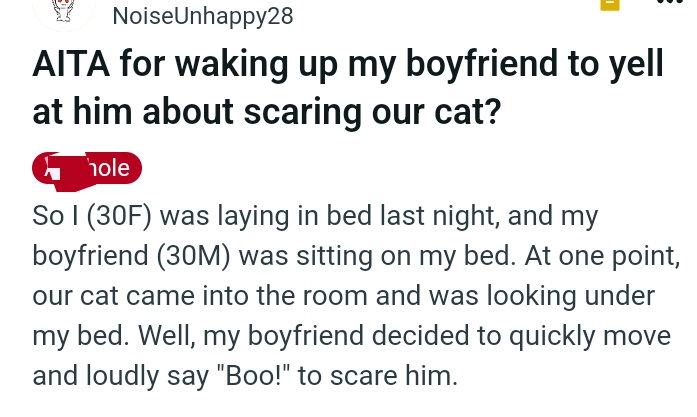
The OP was so angry and upset that she went to her boyfriend's room and woke him up
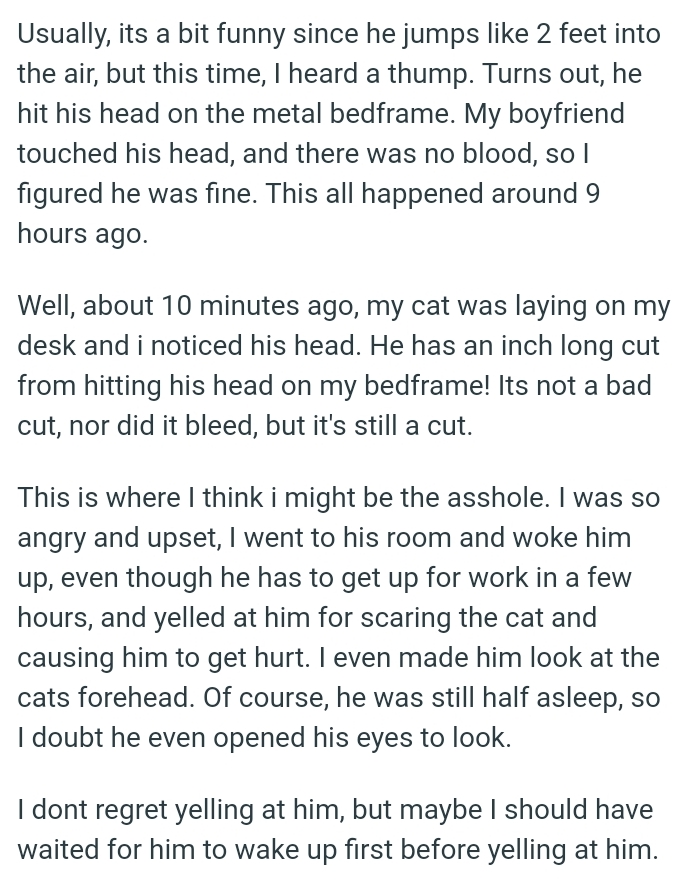
OP has offered the following explanation for why they think they might be the a-hole:
I woke up my boyfriend even though he has work in a few hours, just to yell at him about a cut on our cat's forehead that he caused 8-9 hours ago.
Here are a bunch of the most upvoted comments from other Redditors for you to read through below
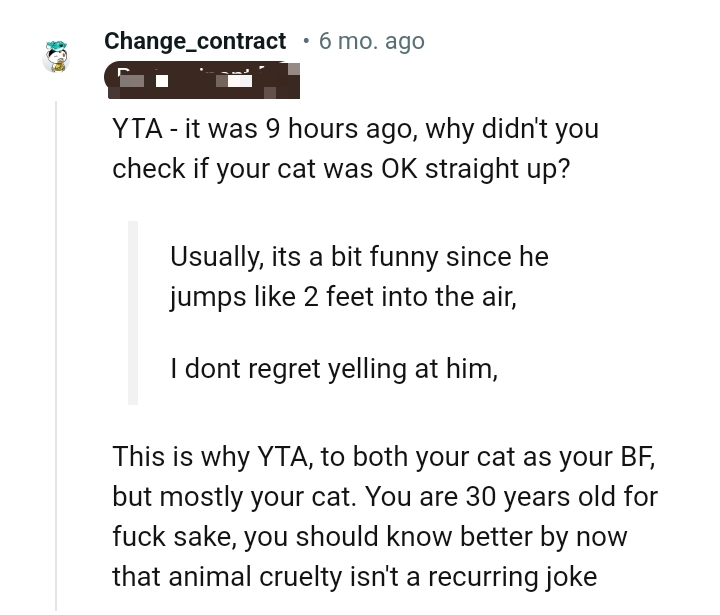
The Psychology of Pet Ownership
Dr. Alice Martin, a veterinary behaviorist at the University of Pennsylvania, explains that pet ownership often comes with emotional attachments that can lead to heightened reactions when pets are perceived to be in danger. This attachment can lead to defensive behaviors, as seen with the angry reaction towards the boyfriend. According to research, pet owners often view their animals as family members, which can intensify their emotional responses to perceived threats.
This emotional connection is essential to understand when analyzing conflicts related to pet care and responsibility.
The Impact of Stress on Relationships
Stress can significantly affect how individuals interact with their partners, particularly in emotionally charged situations. According to Dr. Sue Johnson, a pioneer in couples therapy, "Stress can lead to emotional dysregulation, making it difficult for individuals to respond thoughtfully to their partners." In this case, the cat mother's reaction may be rooted in stress and worry, which can cloud judgment and lead to misunderstandings, as noted by Dr. Michele Weiner-Davis, a marriage therapist who states, "When we are stressed, our ability to communicate effectively diminishes."
All of a sudden, it's a problem
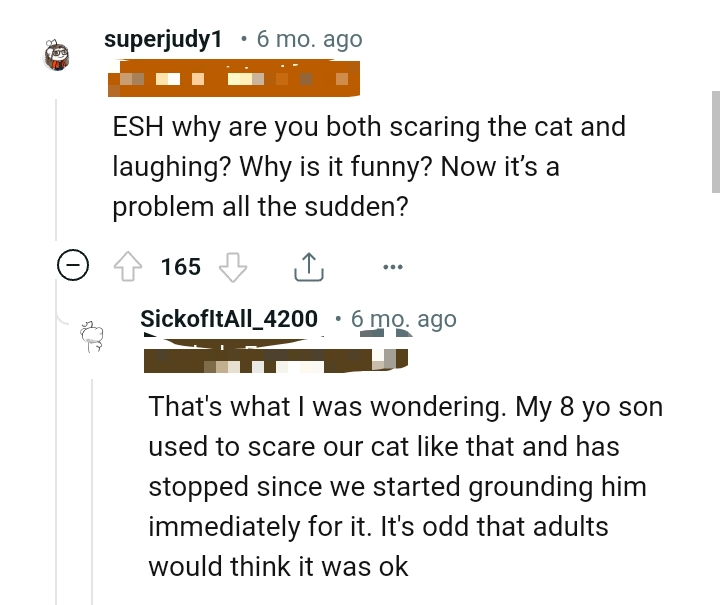
The OP has found this behavior funny in the past
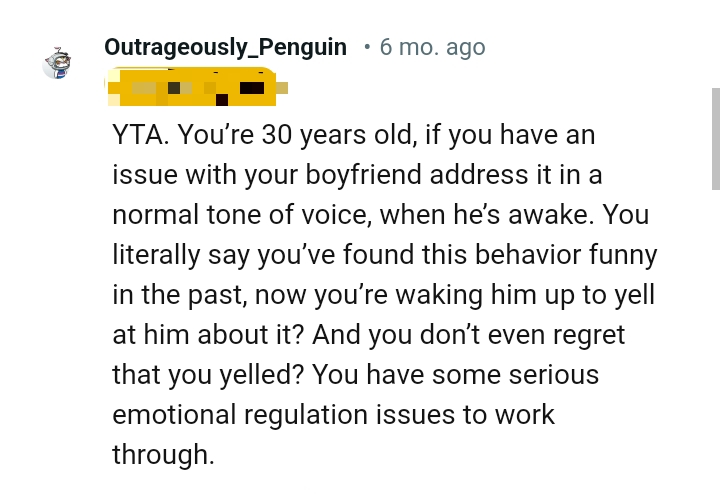
Both of them are at fault
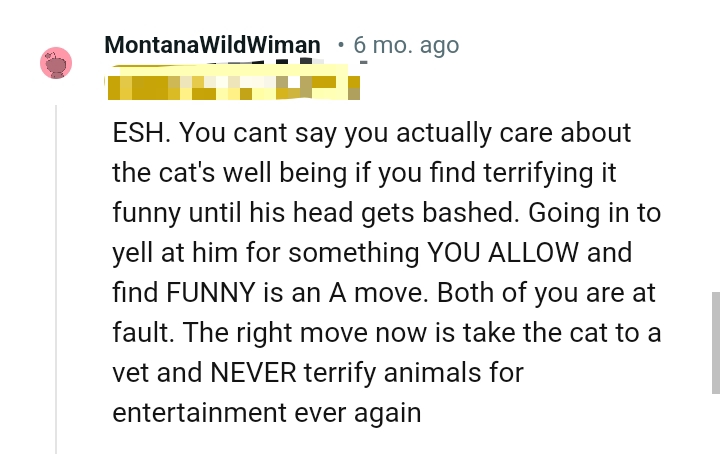
According to a study published in the Journal of Applied Animal Welfare Science, pet owners often experience stress related to their pets' well-being. The study found that pet owners who felt their pets were in danger reported higher levels of anxiety and frustration. This emotional pressure can sometimes lead to misdirected anger towards others, particularly those perceived as responsible for the pet's well-being.
When faced with stress, individuals might revert to defensive behaviors, such as anger or blame. A clinical psychologist notes that these responses are often protective mechanisms that arise when people feel threatened or vulnerable.
Understanding this dynamic can help partners navigate conflicts more effectively by recognizing that emotional reactions may not always reflect true intent.
That amount of time has already passed
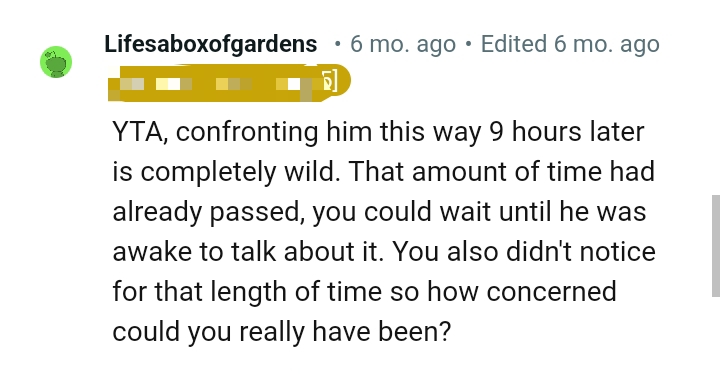
The OP shares more details in the comments
Our cats run into walls and tables. They've hit their heads on things before and were fine. My boyfriend told me the cat wasn't hurt and wasn't bleeding, so I thought I could trust him.
My boyfriend said the cat wasn't hurt, and I thought I could trust his word. The cat was also acting perfectly fine. I only noticed because the cat was lying right in front of me, and I saw that his fur was parted a bit, so I checked. That's when I realized that my boyfriend didn't actually check the cat's head.
This could have happened anytime

The OP found it funny
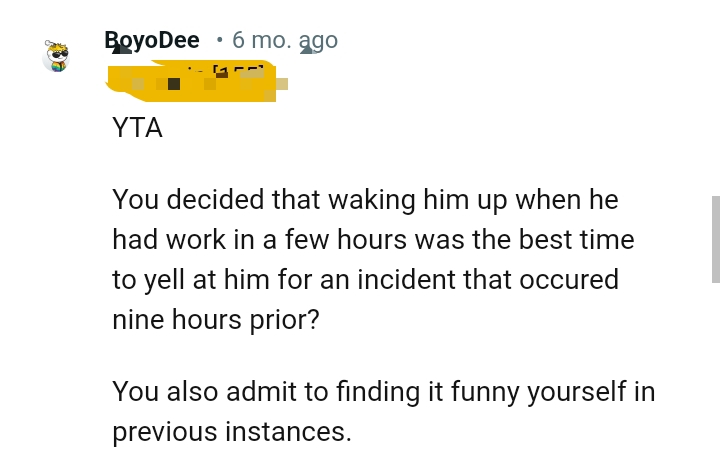
Conflict Resolution in Relationships Involving Pets
In relationships where pets are involved, clear communication about care responsibilities is crucial. Dr. Emily Carter, a relationship expert, suggests that couples should establish shared responsibilities for pet care to prevent misunderstandings. Research shows that couples who collaborate on pet care responsibilities tend to have higher relationship satisfaction and reduced conflicts.
By discussing expectations and dividing responsibilities, couples can foster a sense of teamwork and reduce the likelihood of conflict.
Communicating Under Stress
Effective communication becomes even more crucial in high-stress situations. Research indicates that couples who practice active listening and validate each other's feelings report lower levels of conflict and higher satisfaction.
In this context, it may be beneficial for the cat mother to express her concerns calmly, allowing her partner to respond without feeling attacked.
He doesn't like loud noises
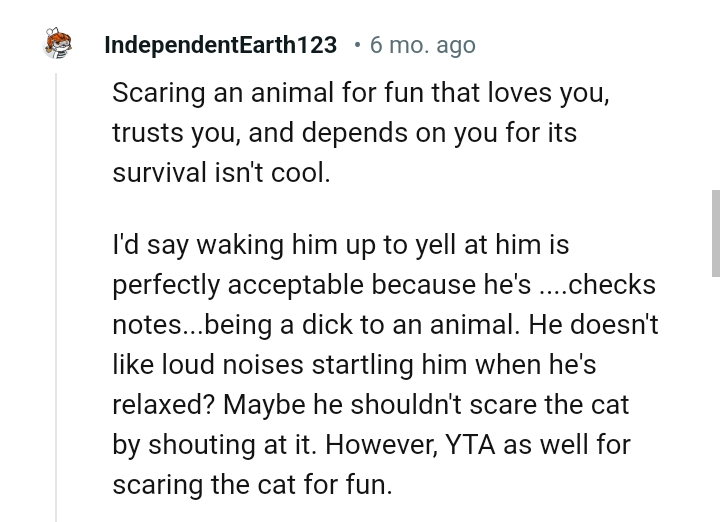
It had an unintended consequence

Many Redditors were astonished as to why OP would yell at her boyfriend. She could have checked the cat herself, so it made no sense to them, and Redditors told OP to behave her age.
What are your thoughts about this story? Drop your comments below and share with your loved ones to get their opinions as well.
Taking a moment to breathe and collect one's thoughts before responding can also mitigate escalating tensions. A study from Stanford University emphasizes that practicing mindfulness in communication can lead to more constructive conversations.
By prioritizing emotional regulation, individuals can foster healthier interactions, even in stressful situations.
Finding Solutions Together
Ultimately, approaching conflicts as a team can promote a sense of unity. Couples therapy experts encourage partners to collaborate on finding solutions to shared concerns, creating a more supportive environment.
Research shows that couples who work together to address issues report higher levels of relationship satisfaction, as it reinforces their partnership.
Psychological Analysis
This situation highlights the ways stress can distort communication and escalate conflicts. Recognizing the underlying emotions can help partners approach disagreements with greater compassion, ultimately leading to healthier interactions and resolutions.
Analysis generated by AI
Analysis & Alternative Approaches
Understanding the impact of stress on interpersonal dynamics is crucial for fostering healthy relationships. By prioritizing effective communication and collaboration, couples can navigate conflicts more successfully and strengthen their bond.
Ultimately, empathy and teamwork are key to overcoming challenges together.
Moreover, understanding each partner's attachment style towards pets can guide how conflicts are approached. A study from the Journal of Personality and Social Psychology indicates that people with secure attachment styles tend to handle conflicts more effectively than those with anxious or avoidant attachment styles. This insight can aid couples in navigating disagreements about pet care and responsibilities.
Understanding each other's emotional connections to their pets can foster empathy and reduce defensive reactions during conflicts.
Practical Strategies for Managing Pet-Related Conflicts
To manage conflicts related to pet care, couples should engage in open conversations about their expectations and feelings regarding pet responsibilities. Creating a list of shared duties can help clarify roles and reduce misunderstandings. Research indicates that developing clear communication strategies can significantly improve relationship satisfaction.
Additionally, couples may benefit from setting aside regular check-ins to discuss any emerging pet-related concerns, allowing for proactive conflict resolution before issues escalate.
Psychological Analysis
This situation reveals how deeply pet ownership can impact emotional responses in relationships. It's crucial for partners to communicate openly about their feelings and expectations regarding pet care to prevent conflicts from arising.
Analysis generated by AI
Analysis & Alternative Approaches
In conclusion, the emotional attachment to pets can create complex dynamics in relationships. By fostering open communication and understanding each partner's perspective, couples can navigate conflicts related to pet care more effectively. Research consistently shows that collaboration and shared responsibilities enhance relationship satisfaction and reduce misunderstandings.



